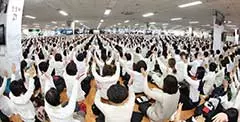
by Massimo Introvigne (CESNUR)
Media all around the world are focusing attention on Shincheonji Church, a South Korean Christian new religious movement, after members of the church’s Daegu congregation were infected by the coronavirus.
As a scholar who has studied Schincheonji, I am concerned with the fact that international media that obviously know nothing about it have ‘discovered’ this church overnight because of the coronavirus incidents in Korea, and have repeated inaccurate information they found on low-level Internet sources.
Even of more concern is the fact that Shincheonji members who have contracted the virus, who are the victims in this story, are being treated unfairly by the Korean media and described as “cultists.” Worse still, some Shincheonji members have been insulted, discriminated and forced out of their jobs, as scapegoats for what has become a national and international hysteria about the virus.
As far as I have ascertained, Shincheonji is cooperating with the Korea Centers for Disease Control and Prevention (KCDC) to contain the coronavirus, complying with all the indication of the authorities, and even testing for the virus all its members at its own expenses. Some politicians and media in South Korea are scapegoating Shincheonji for the epidemics, in order to distract the public attention from widespread criticism leveled at them for the fact that, despite concerns voiced by the Korean Medical Association, South Korea did not prohibit entry into the country from China. The South Korean public news agency, Yonhap News, mentioned the possible relationship between the arrival of 1,000 Chinese students in school trips to Daegu last month and the outbreak of the epidemics there. Instead, Shincheonji is unfairly blamed, even if, 24 hours after one of its devotees was identified as infected with the virus, it provided the authorities with a full list of its members. Members were also encouraged to tell co-workers and their bosses that they belong to Shincheonji—no small step, since because of the anti-Shincheonji campaigns normally they keep a low profile in the workplace and now they put themselves at risk of being insulted, threatened, and even lose their jobs.
The anti-Shincheonji sentiment in South Korea is fueled by fundamentalist Christian groups, which are much more influential in that country than elsewhere in the world and are disturbed by Shincheonji’s rapid growth. These groups have a history of vitriolic propaganda and even physical violence against Shincheonji, whose members are routinely kidnapped and confined to be submitted to forced conversion (deprogramming), and now went so far to accuse Shincheonji to intentionally spread the virus and to call for the forced dissolution of Shincheonji. Spreading fake news in a moment of national crisis is dangerous and irresponsible.
Further poisoning the atmosphere is the fact that political elections will be held in South Korea on April 15, and that hate speech against new religious movements is used both as an electoral tool and a way to take the attention away from public criticism of politicians who handled the coronavirus crisis poorly, and the fact that Reverend Jeon Kwang-hoon, the president of the Christian Council of Korea and the leader of the main anti-Shincheonji coalition in South Korea, has been arrested on February 24 on charges of violating the law regulating electoral campaigns.
Some fundamentalist groups are using the virus epidemics as a pretext to increase their campaign against Shincheonji, in the hope that the virus may achieve what they failed to accomplish, i.e. putting a halt to Shincheonji’s spectacular growth, which largely happens at their expenses. While Shincheonji certainly has a peculiar theology, and it is normal that others disagree with it, fundamentalist anti-cult Korean Protestants are now engaged in a shameful form of profiteering. Responsible international media should be wary of inadvertently cooperating with it.
Source: CESNUR





